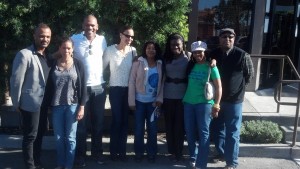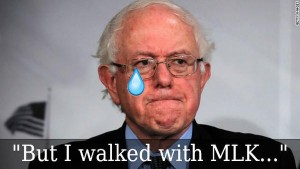Walk on water? Perform the miracle of five loaves and two fish?
To hear rhapsodic left-progressive Sanders’ acolytes tell it, these are just two of his many gifts as a beacon of social justice. It was not always so. Over the past two years, Sanders has been challenged by Black Lives Matter and Black Alliance for Just Immigration activists, as well as African American commentators, about his mantra that remedying economic inequality is the only antidote to racial inequity. Flash forward to the 2016 presidential campaign and the #FeeltheBern magic has captivated many African American and people of color progressives critical of Hillary Clinton’s neoliberal complicity in building the carceral state. Forced into a swift baptism, Sanders has become a regular civil rights evangelist, condemning the evils of racial discrimination and mass incarceration during high profile campaign appearances that have made him the darling of celebrity black intellectuals like Ta-Nehisi Coates and Cornell West as well as filmmaker Spike Lee.
Yet, Sanders’ dubious record on racial justice in his own state appears not to have presented a meaningful hurdle for his most fervent black supporters. Although African Americans are 1.2% of Vermont’s population, their small numbers only partly explain Sanders’ well-documented disdain of intersectional analyses of race, poverty and economic inequality.
A recent article in the Daily Beast outlined his rocky relationship with leaders in Vermont’s African American community. “Feeling the Bern” in another way, black leaders in Vermont have long criticized Sanders’ paternalism on race and racism. In a 2014 NPR interview about his presidential aspirations, Sanders was asked about racial disparities in job access and income. He dismissed the question, implying that it was short-sighted if not petty; briskly pivoting to the more pressing issue of the Democrats’ failure to court white working class voters. According to Curtiss Reed, head of the Vermont Partnership for Fairness and Diversity, Sanders constantly deflected on providing solutions to institutional racism with platitudes about addressing income inequality “overall”. As one African American leader from Vermont contended, “voters of color are simply not on his radar” and are treated with “disdain”. One activist dubbed Sanders as MIA on issues of racial profiling, black mass incarceration and maintaining the state’s charter to the U.S. Commission on Civil Rights. So while Sanders’ newfound fiery rhetoric on the New Jim Crow has elicited black adoration, according to The Sentencing Project, African Americans “are sentenced to prison in Vermont at 12-and-a-half times the rate for whites. The percentage of blacks in Vermont prisons is nearly twenty times greater than the percentage in the general population.” Blacks account for over 10% of the state’s prison population and are incarcerated at greater rates than in lockdown champions Wisconsin, Texas and Louisiana. In addition to its appalling incarceration numbers, Vermont’s African American students are disproportionately suspended and expelled.
Sanders’ reductive stance is a familiar one in the racially polarized history of left-radical alliances. In the early twentieth century, African American involvement in interracial communist-socialist organizing and coalition-building was undermined both by overt white racism and the white socialist thesis that capitalism alone posed the gravest threat to disenfranchised people of color (see for example Earl O. Hutchinson’s Blacks and Reds, Robin Kelley’s Hammer and Hoe and Jeffrey Perry’s Hubert Harrison: The Voice of Harlem Radicalism). White segregationists, often driven by white immigrant animus toward black workers, played a key role in early twentieth century socialist organizing. Socialist icon and four-time presidential candidate Eugene Debs once commented that we “have nothing special to offer the Negro, and we cannot make separate appeals to all the races.” This stance elicited scorching criticism from prominent socialist-aligned African American leaders like radical black freethinkers Hubert Harrison and A. Philip Randolph.
Until his Road to Damascus awakening, Sanders, like Clinton, said nary a word about the role white supremacy plays in black folks’ struggle for jobs, housing, equitable education and redress of the pervasive institutional violence against black women. Nonetheless, on the other end of the spectrum, African American leaders in the Congressional Black Caucus (CBC) rallied around Clinton and openly disdained Sanders’ oft-trotted out reference to his civil rights involvement back in the 60s. This was no surprise given the CBC’s lockstep march with the Clinton regime and the Obama administration. In a recent column in The Nation, New Jim Crow author Michelle Alexander argued that Clinton was “not deserving” of black votes yet dismissed the prospect of a viable Bernie-led revolution within the confines of the Wall Street-aligned Democratic Party.
As Alexander contends, “Even if Bernie’s racial-justice views evolve, I hold little hope that a political revolution will occur within the Democratic Party without a sustained outside movement forcing truly transformational change. I am inclined to believe that it would be easier to build a new party than to save the Democratic Party from itself.” And if Sanders’ tenure with black folk in Vermont is any indication, he’s hewing to the Democratic Party playbook—ignore black voters until you have to go south of the Mason-Dixon or Black History Month rolls around, then “freedom fight”, and photo op, like hell.



